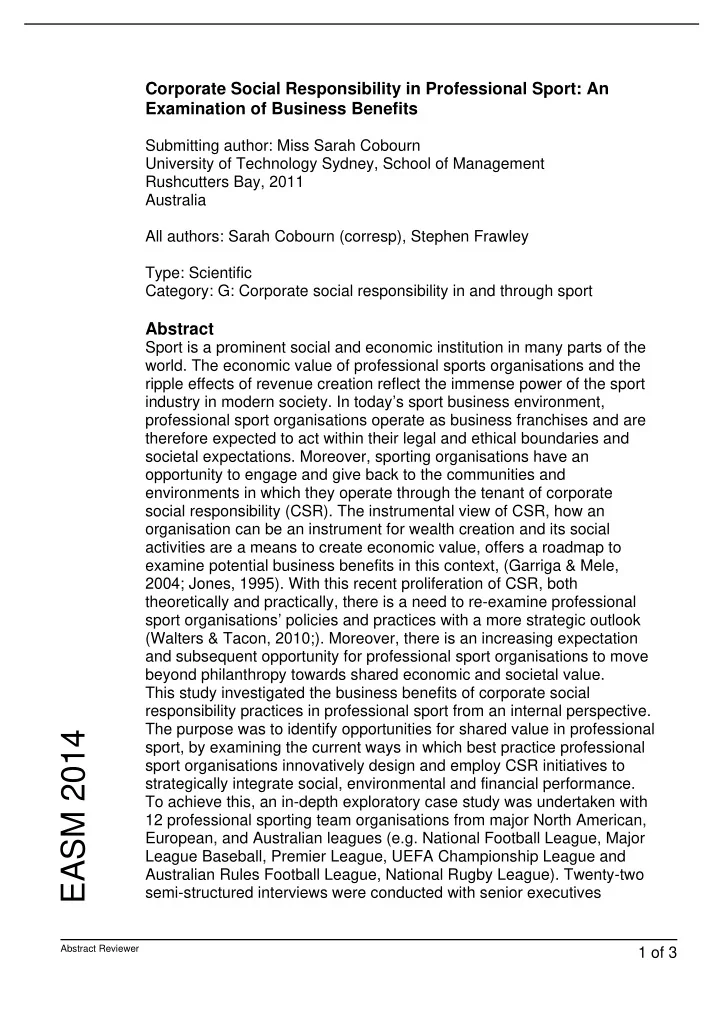

Corporate Social Responsibility in Professional Sport: An Examination of Business Benefits Submitting author: Miss Sarah Cobourn University of Technology Sydney, School of Management Rushcutters Bay, 2011 Australia All authors: Sarah Cobourn (corresp), Stephen Frawley Type: Scientific Category: G: Corporate social responsibility in and through sport Abstract Sport is a prominent social and economic institution in many parts of the world. The economic value of professional sports organisations and the ripple effects of revenue creation reflect the immense power of the sport industry in modern society. In today’s sport business environment, professional sport organisations operate as business franchises and are therefore expected to act within their legal and ethical boundaries and societal expectations. Moreover, sporting organisations have an opportunity to engage and give back to the communities and environments in which they operate through the tenant of corporate social responsibility (CSR). The instrumental view of CSR, how an organisation can be an instrument for wealth creation and its social activities are a means to create economic value, offers a roadmap to examine potential business benefits in this context, (Garriga & Mele, 2004; Jones, 1995). With this recent proliferation of CSR, both theoretically and practically, there is a need to re-examine professional sport organisations’ policies and practices with a more strategic outlook (Walters & Tacon, 2010;). Moreover, there is an increasing expectation and subsequent opportunity for professional sport organisations to move beyond philanthropy towards shared economic and societal value. � This study investigated the business benefits of corporate social responsibility practices in professional sport from an internal perspective. The purpose was to identify opportunities for shared value in professional EASM 2014 sport, by examining the current ways in which best practice professional sport organisations innovatively design and employ CSR initiatives to strategically integrate social, environmental and financial performance. To achieve this, an in-depth exploratory case study was undertaken with 12 professional sporting team organisations from major North American, European, and Australian leagues (e.g. National Football League, Major League Baseball, Premier League, UEFA Championship League and Australian Rules Football League, National Rugby League). Twenty-two semi-structured interviews were conducted with senior executives Abstract Reviewer 1 of 3
responsible for the design, implementation and management of CSR policies and programs. Organisational documents and archival records including media clippings, annual reports, press releases, and marketing collateral were acquired over the course of 18 months. Collected content and transcribed interviews were analysed using NVivo™, a qualitative data analysis program, in which codes were assigned to the data and themes and patterns were determined. Three levels of coding were used (open, axial and selective coding) (Miles & Huberman, 1994) and results were organised into first and second-order concepts.� Results from the study reveal ways in which best practice professional sport organisations may bring social and economic goals into alignment with stakeholder interests to improve business results. Business benefits associated with CSR initiatives included cost and risk reduction, competitive advantage, and increased brand awareness, reputation and fan engagement. For example, environmental strategies towards energy efficiency and waste reduction provided an opportunity for significant cost savings and increased brand image for the organisation. Furthermore, results indicate that comprehensive measurement and evaluation of CSR initiatives was an important contributing factor towards proving and improving the economic benefits of current programs. Partnerships and collaborations between professional sport organisations and other businesses and charitable organisations in their local communities created important ‘win-win’ outcomes, strengthening the link between a sport organisation’s success and community support and the opportunity for synergistic value creation.� From a theoretical perspective, results reflect the progressive shift towards the concept of shared value in management practice in the professional sports industry, indicating that social, environmental and economic goals can strategically align to improve long-term business results. Additionally, integration of stakeholder interests with the alignment of social and economic goals may create increased economic benefits. The implications of these findings suggest that there are significant opportunities for shared value in the professional sport industry. Moreover, these results provide practical evidence-based examples of how sport management practitioners may transform the role of CSR on professional sport organisations into an opportunity for increased business benefits and economic success. EASM 2014 References Garriga, E., & Melé, D. (2004). Corporate social responsibility theories: Mapping the territory. Journal of Business Ethics, 53(1), 51-71.� Jones, T.M. (1995). Instrumental stakeholder theory: A synthesis of ethics and economics. Academy of Management Review, 20, 404-437.� Miles, M. B., & Huberman, A. M. (1994). Qualitative data analysis: An expanded sourcebook (2nd ed.). Thousand Oaks, CA: Sage Publications Inc.� Walters, G., & Tacon, R. (2011). Corporate Social Responsibility in Abstract Reviewer 2 of 3
European Football: Birkbeck University of London. EASM 2014 Abstract Reviewer 3 of 3
Recommend
More recommend